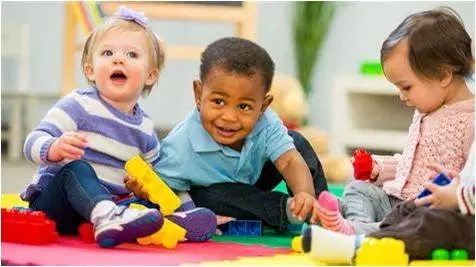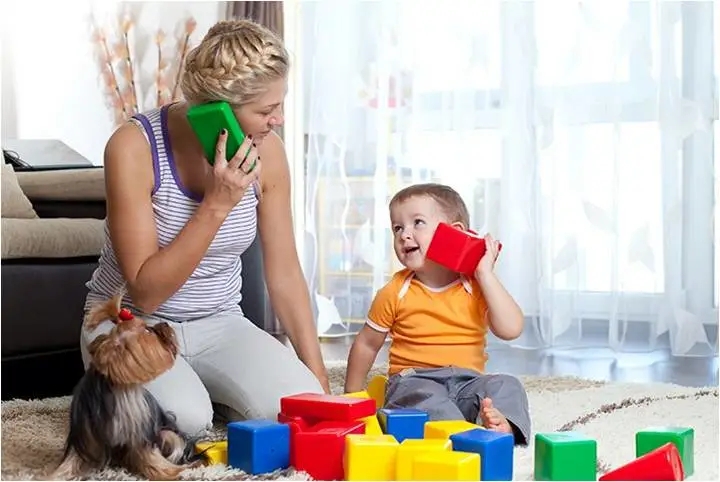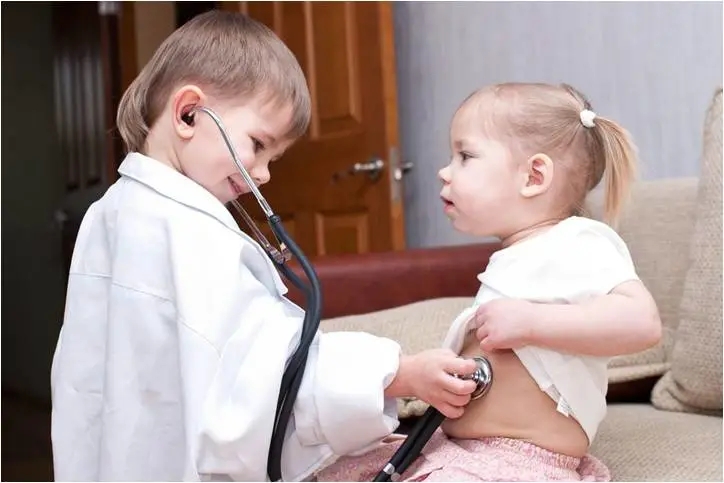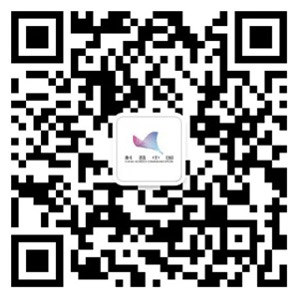这是 达医晓护 的第 2945 篇文章
上一篇我们介绍了宝宝从18月龄到24月龄各阶段发育的科普。本次的主题是接着一起来看看2到3岁孩子的正常发育轨迹,如何促进孩子的发育,以及在什么情况下需要引起重视去看医生。
 情感发展
情感发展
这个年龄阶段是孩子情感发展最重要的时期之一。在体验和经历很多情绪的同时也在学着了解别人的感受。发脾气在这个阶段是很正常的,因为孩子们通常不知道如何用语言来表达诸如沮丧、愤怒、尴尬、内疚和羞耻之类的“大”情绪。
孩子们也开始逐渐明白他们的行为如何影响你,还有你的行为如何影响他们。同时分离焦虑也开始减少,当你离开的时候,他们也不会那么难过。
语言发育
在2岁左右,幼儿可能会用2-3个单词的短语,会说“我”、“你”和“我”。在这个阶段,孩子将会学习和使用大量的词汇,说话也容易被听懂。到了3岁左右,幼儿通常可以使用3-5个单词甚至更多单词的短句,并开始学着如何有来有往,轮流说话,可能会和父母开始有简单的对话。
在这个时期,孩子开始尝试如何谈论白天发生的事情。在你的帮助梳理下,孩子可以把事情按顺序来组成一个简单的故事,比如说“我去购物”,“那你在店里干什么啊?“买牛奶”。到3岁时,你的孩子也许会根据自己的经历来编一个简单的故事,虽然可能会很短。这个年龄,孩子也会说一些不在他们眼前的人和物品,例如,“在商店里的奶奶”或“我的球在树上”。
思维
从出生到现在所学到的一切都帮助了孩子的思维发展。你的孩子开始理解时间和相反的概念,例如,大-小,白天-晚上。孩子也会开始对物体进行分类,并匹配形状和颜色。你的孩子开始记得有些东西是什么样子的,比如苹果看起来又红又圆。
游戏和学习
游戏很重要,因为孩子是在游戏和活动中学习知识和成长的。在这个阶段孩子会喜欢和别人一起玩,比如玩扮装游戏,举行茶会,用手指或刷子画画,玩“追逐打闹”游戏。当孩子在和你或其他小朋友玩耍时,你可能会发现你的孩子在交替轮流方面越来越好。另外,讲故事、唱歌和读书也是孩子在这个年龄的乐趣所在。
日常生活技能
在这个时候,孩子们热衷于自己做更多的事情。例如,他可能会自己洗手、洗澡、吃饭以及穿衣服,不过可能更擅长脱衣服而不是穿衣服!由于这些技能还在学习中,所以孩子还需要大人的帮助。你还可以让你的孩子帮助你做家务,比如扫地或擦灰,从而建立他们独立做事的信心。当他们被当做一个帮手时,他们会感到非常自豪。
在2岁左右,如果孩子出现以下的迹象,意味着可能已经准备好如厕训练了:
在没有帮助的情况下,你可以完成大多数你要求的事情
看别人上厕所很有兴趣-虽然这可能会让你感到尴尬或不舒服,但这是一种很好的引入如厕训练的方式
在尿布上拉粑粑或小便后会来告诉你
可以遵循简单的指令,比如“把球给爸爸”。
耐心观察看是否你的孩子已经准备好如厕训练,但不要太过用力推动。自己上厕所对你的孩子来说是最难学的事情之一,因为它需要很多技巧。例如,孩子需要知道他们什么时候需要小便或大便,需要明白他们应该在厕所里小便或大便,能够坐上他的便盆或爬上马桶,并学会拉下拉上衣服等等。
运动
在这个年龄,孩子们奔跑时的摔倒比之前要减少,并开始自己上下楼梯,虽然有时会扶着栏杆来保持平衡。举手过肩投球,踢球,或者接球也比之前做的更好了。另外,孩子还可能会单脚站立几秒钟。
在18-24个月这个年龄阶段,宝宝可能还会:
双脚定点跳
骑三轮车
认识物体并命名
上楼时可以双脚交替
 如何促进18到24月龄宝宝发育?
如何促进18到24月龄宝宝发育?
1. 创造机会让给孩子与他人玩耍:游戏是孩子交朋友和学习如何与其他孩子相处的好方法。但现在这个阶段不要指望他们学会分享和轮流玩-这是正常的,这个年龄的幼儿认为一切都属于他们自己的。
2. 鼓励孩子练习日常生活技能:生活中要鼓励孩子使用勺子、自己穿上鞋子等日常生活技能。这些技能的运用会锻炼到一系列大小肌群的的运动以及协调性,以及同时思考自己正在做什么的能力。
3. 陪孩子说说话:和她交谈时告诉她日常生活中事物的名称——比如身体各个部位、玩具和家庭生活用品,如勺子或椅子,这样可以培养孩子的语言能力。在这个年龄,你可以教逐步地教你的孩子,比如一个“苹果”可以是一个“大苹果”、“红苹果”甚至是一个“大红苹果”。
4. 当孩子和你说话时,通过倾听和回答,让孩子觉得说话有意思。例如,孩子说“妈妈 牛奶”,你可以回答他,“你要妈妈给你拿牛奶吗?”这样就鼓励了双向对话,帮助孩子培养沟通能力,同时也会让他感到被重视和被疼爱。
5. 陪宝宝一起阅读:和孩子一起阅读、讲故事、唱歌和背诵童谣,可以鼓励孩子说话和培养他的想象力。
6. 和孩子一起做饭:这有助于你的孩子对健康食物感兴趣,学习一些新单词,并开始熟悉数学概念,如“一半”、“一茶匙”或“30分钟”。你可以让孩子做一些简单的烹饪活动,比如拌个沙拉或者卷个饼。
7. 当孩子学会一项新技能时,给予积极的关注,不要吝啬你的赞美,和他一起来庆祝这个进步。同时,要帮助和鼓励孩子继续练习他们所学会的本领。
 在什么情况下需要引起重视去看医生
在什么情况下需要引起重视去看医生
如果观察到2岁的孩子有下述情况之一的,需要带孩子去看医生进一步评估。
看东西或听东西有困难
还不会说2个单词的短语,比如“红苹果”
不会遵循简单的指令-例如,“请把球拿给我”
不会模仿动作或语言-例如,唱儿歌“Heads, shoulders, knees and toes”
不会玩角色扮演的过家家游戏—例如,不会假装喂洋娃娃吃东西
不会表现出他们的喜好或感情
不会过来寻求你的爱抚或安慰
不会上下楼梯,哪怕是拉着大人或楼梯扶手
不会奔跑
握拿小的东西有困难,比如蜡笔
不会涂鸦乱画
如果观察到3岁的宝宝有下述情况之一的,需要带孩子去看医生进一步评估。
和你没有目光对视
看东西或听东西有困难
不会说3个单词的短句
和父母,家庭成员或朋友说话时很难被听懂
不会遵循简单的指令-例如,“请把球拿给我”
对其他孩子没有兴趣
很难和照顾者分离
不会玩角色扮演的过家家游戏—例如,不会玩假装购物或乘公交车的过家家游戏
不会奔跑
不会涂鸦或画画
握拿小的东西有困难,比如铅笔,蜡笔
What’s happening to your toddler’s 2-3 years
Feelings
This is one of the most important ages for emotional development. Your toddler is going through lots of emotions while also learning about other people’s feelings. Temper tantrums are normal, because children often don’t know how to put words to ‘big’ emotions like frustration, anger, embarrassment, guilt and shame.
Your toddler is also starting to understand how their behaviour affects you and how your behaviour affects them. Your toddler won’t have as much separation anxiety, and they might not get so upset when you leave them.
Talking
Around two years, toddlers might be able to use sentences of 2-3 words and say ‘I’, ‘you’ and ‘me’. Your toddler will learn and use lots of words and be easier to understand when talking. At three years, toddlers can usually use sentences of 3-5 words, or even more. Your toddler will start learning how to take turns when speaking, and might be able to have a short conversation with you.
Your toddler is learning how to talk about things that have happened during the day. With your help, your toddler might be able to put things in order to make a simple story – for example, ‘I go shop’. ‘And what did you do at the shop?’ ‘Buy milk.’ By three years, your toddler might be able to tell a simple ‘made-up’ story based on their own experiences, but it will probably be quite short. At this age your toddler will also talk about people and objects that aren’t with them – for example, ‘Grandma at the shops’, or ‘My ball in tree’.
Thinking
Everything toddlers have learned so far have developed their thinking. Your toddler is starting to understand concepts like time and opposites – for example, big/small and day/night. Your toddler will also start to sort objects, and match shapes and colors. And your toddler is starting to remember what some things look like – for example, apples look red and round.
Playing and learning
Play is important because it’s how children learn. Your toddler will enjoy playing with others, playing dress-ups, having tea parties, painting with their fingers or a brush, and playing ‘rough and tumble’. When your toddler plays with you or other children, you might find that your child is getting better at taking turns. Telling stories, singing and reading are also fun things for your child to do at this age.
Everyday skills
Around this time, children are keen to do more things for themselves. For example, your toddler can probably wash their own hands, wash themselves at bathtime, feed themselves and get dressed – although your toddler is probably better at taking clothes off than putting them on! And your toddler is still learning so you might still need to help. You can build your toddler’s confidence in doing things independently by letting them help you around the house with chores like sweeping or dusting. Your toddler will feel very proud when they’re a good helper.
Your toddler might even be ready to start toilet training. Some of the signs are if your toddler:
·can do most things that you ask without your help
·is interested in watching others go to the toilet – this can be awkward or make you uncomfortable at first, but it’s a good way to introduce things
·lets you know when they do a poo or wee in their nappy
·can follow simple instructions like ‘Give the ball to Daddy’.
Watch and see whether your toddler is ready for toilet training – but try not to push it. Going to the toilet is one of the hardest things for your child to learn because it uses so many skills. For example, your toddler must know when they need to do a wee or a poo, understand that they should do wees and poos in the toilet, be able to walk and climb onto the potty or toilet, and pull clothes up and down.
Moving
At this age, children can run and will probably fall less. Your toddler is starting to walk up and down stairs on their own, but will sometimes use the rail for balance. Your toddler is now better at throwing overarm, kicking and catching a ball, and might even stand on one foot for a few seconds.
At this age, your toddler might also:
· jump on the spot
· ride a tricycle
· recognise objects and name them
· use one foot and then the other foot when walking up stairs.
How to help your toddler development at this age:
1.Give your toddler the chance to play with others: play is a great way for your toddler to make friends and learn how to be with other children. But don’t expect sharing and taking turns just yet – toddlers still think that everything belongs to them.
2.Encourage everyday skills like using a spoon and putting on shoes. These skills involve both small and big muscle movements, as well as your toddler’s ability to think about what they’re doing.
3.Talk with your toddler: naming and talking about everyday things – body parts, toys and household items like spoons or chairs – helps develop your toddler’s language skills. At this age, you can teach your child that an ‘apple’ can be a ‘big apple’, ‘red apple’ or even a ‘big red apple’.
4.Give meaning to your child’s talking by listening and talking back to them. If your toddler says ‘Mama milk’, you might reply by saying ‘You want Mum to get you some milk?’ This also makes your toddler feel valued and loved.
5.Read to your toddler: you can encourage your child’s talking and imagination by reading together, telling stories, singing songs and reciting nursery rhymes.
6.Do some cooking with your child: this helps your toddler to get interested in healthy food, learn some new words, and start to become familiar with maths concepts like ‘half’, ‘1 teaspoon’ or ‘30 minutes’. You can give your toddler simple cooking activities, like tossing a salad or putting together roll-ups.
7.When your toddler learns a new skill, celebrate the achievement with lots of praise and positive attention. It’s also a good idea to help and encourage your toddler to keep doing the things they’ve learned.
When to be concerned about toddler development at 2 years
·has trouble seeing or hearing things
·isn’t using two words together – for example, ‘Red apple’.
·can’t follow simple instructions – for example, ‘Please give me the ball’
·doesn’t copy actions or words – for example, when singing ‘Heads, shoulders, knees and toes’
·doesn’t pretend during play – for example, doesn’t pretend to feed a doll
·isn’t showing feelings
·doesn’t come to you for affection or comfort.
·can’t walk up and down stairs, even if holding on to you or a rail
·can’t run
·finds it hard to handle small objects – for example, a crayon
·isn’t scribbling or trying to draw.
When to be concerned about toddler development at 3 years
·doesn’t look you in the eye
·has trouble seeing or hearing things
·isn’t using three-word sentences
·is often hard to understand when talking to you, family or friends.
·doesn’t understand simple instructions – for example, ‘Please give me the ball’
·isn’t interested in other children
·finds it difficult to separate from their primary caregiver
·doesn’t pretend during play – for example, doesn’t pretend to play ‘shopping’ or ‘riding on the bus’.
·can’t run
·isn’t scribbling or drawing
·finds it hard to handle small objects – for example, a pencil or crayon.
作者:澳大利亚墨尔本大学医学院儿科博士
百汇医疗(中国)儿科医师
蒋本然




 扫码下载APP
扫码下载APP

 科普中国APP
科普中国APP
 科普中国
科普中国
 科普中国
科普中国